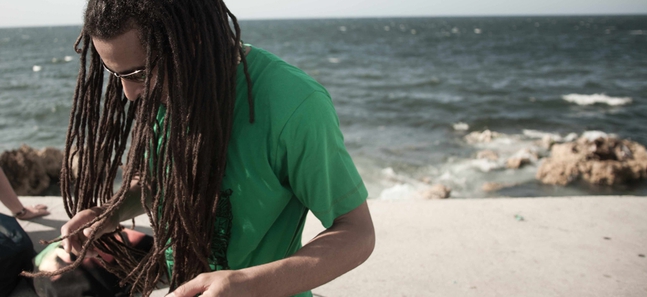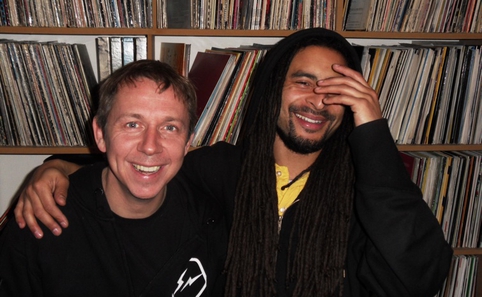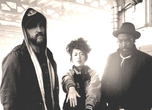Mala: the interview
Salsa and sub-bass: the dubstep progenitor talks ‘Mala in Cuba’

Posted: Fri Sep 07 2012
Until fairly recently, when a dance producer announced that they were making a world music album, it was only natural to make a polite excuse and run in the opposite direction. That's all started to change in the past few years, as a disparate group of producers – from itinerant beatmaker FIlastine to Damon Albarn and his Kinshasa One Two project – have found ways to meld electronic music and global sounds that don't invoke the spirit of Deep Forest and the Buddha Bar compilations.
The latest contribution to this not-exactly-a-trend comes from an unlikely corner: Mark Lawrence, aka Mala. A key figure in the early days of dubstep, when he ran the seminal DMZ parties with friends Coki (his co-conspirator in production duo Digital Mystikz) and Loefah, the dreadlocked bass merchant didn't seem like the most obvious candidate for making an album of Cuban music. Speaking on the phone to Time Out from his home in Belgium, Mala (who's originally from South London) is inclined to agree – but then again, he was being asked to produce the album by none other than Gilles Peterson, who's been making periodic trips to the Caribbean republic as part of his Havana Cultura project.
Whatever its creator's initial misgivings, the resulting record is a triumph. On Mala in Cuba, which is released via Peterson's Brownswood Recordings, Lawrence recreates the country's music in his own image. Working with musicians including pianist Roberto Fonseca and timbale master Changuito, he produces a hybrid of sub-bass and chopped-up salsa that's utterly unique. And to think that this is actually his first proper album...
Do they have any kind of sound system culture in Cuba?
Not that I experienced. There are definitely clubs there, and obviously the clubs have sound systems in. It was just mainly reggaeton, trance, electro kind of stuff, some hip hop – especially Cuban hip hop. And in the venues as well, especially the outdoor ones and bars and stuff, you'd get a lot of musicians playing. But there's only about two clubs in the whole of Havana anyway. There's a lot of bars, and there's places that have got that feel in terms of their environment, but in terms of a club being a really dark space, and a sound system, there's not many of them at all.
So did you any obvious common ground with the musicians you were working with?
Not really, to be honest – other than, I guess, that we love what we do. I think their approach to music is perhaps very different from mine, because they are musicians, while I see myself as just a producer. I really just piece music together: I couldn't hum a C if you asked me to. It really allowed me to learn about Cuban music, because they were very generous in what they played for me. In terms of the actual music itself… the general tone and the kind of scale that Roberto Fonseca would play in is very different from the keys and the tone that I like to play, so sometimes I had to detune the piano or pitch-shift it to get it on the frequency that I like working with. But in regards to the percussion and the drums, it was phenomenal to be able to work with such quality audio, and such a musician behind the instrument.
When you're taking stuff like that and putting it on the sequencer grid, is there ever the fear that you're going to kill the essence of what made it good in the first place?
Yeah, definitely. That was probably one of the main issues that I had when working with the musicians. I took about 50GB home of [recordings of] them playing, so when I was working all that, I definitely wanted to respect what they had given me, and kind of keep it as raw as possible. When you put percussion on the grid, for example, you don't always want to start quantizing it and all those things there – you just see what you have in front of you. I really did try to work with what they gave me, with as little editing as possible. But it's inevitable: some things I'd have to really cut up. Maybe I'd only take four bars from here and then 16 bars later there'd be another four bars that I could use, and then you'd loop it up and stuff like that. I worked lots of different ways on the tracking – like with all things, it just depends on what you're trying to get, which can kind of determine how you work.
I suppose it would be difficult for you to answer this yourself, but why do you think that Gilles Peterson chose you for this project?
I'm really not sure, to be honest with you. When he asked me, and I thought about it, I did say to him: Out of all the musicians that you've worked with and could work with, why did you choose me? And he just said that he's really interested in my sense of rhythm from the previous records he's heard of mine. Also, my dad's from Jamaica, and with Cuba being literally a hundred miles or so away from there, he saw that as a connection point as well.
Just picking up on what you said about rhythm: the first time I listened to the record, it made me think of some of your earlier tracks which had more complex percussion – like 'Anti War Dub' and 'Bury Da Bwoy'. Do you see any connection?
Yeah, definitely. After the initial apprehension and anxiety about taking on such a project, thinking about the percussion that you've got in Cuba from the congas and the timbales – the rhythms themselves – I was pretty excited to have these musicians play authentic percussion for me. Throughout the record, I'd take the hi-hats, say, from the drummer, and then find a nice percussive loop that I liked, and often that's how I would start building. That's what I probably related to the most, actually: the percussion.
Your earlier releases on the DMZ label have long since sold out, but this one is actually going to be available in perpetuity. Did that change the feeling when you were making it?
It wasn't something that I thought about, to be honest with you. I think what did change my approach was that I've never been asked to write a record for another record label before – or even if I have, I've never agreed to do it; I've never done an album before; I've never worked with live musicians before, especially not from another country. So all these things already were making my approach different. Even if it wasn't so different in terms of what I actually did in the studio, what my mind was going through was completely different. In the studio, you kind of write music for selfish reasons – but in the most unselfish way, if that makes sense. But I wanted Gilles and Havana Cultura and Brownswood to be pleased with the record, because they invested time and confidence and money in me. And the same with the musicians, as well: I feel they gave me so much, and they really opened me to a real new colour and rhythm of sound. I wanted to respect them, and I wanted to respect their culture and the history that they brought as well. So there were all these other factors, which I was naturally thinking about whilst I was making music, and it was those things that really changed my approach, rather than it being available for the rest of my days. That I'm not too worried about, you know.
It sounds like you were just part of something that was bigger than you...
For sure. That's how I see myself in this universe anyway, you know? In the most un-clichéd, cheesy way, the whole project was really a life-changer. It was just a totally different way of working from anything previous, and with what I had to do… it was very challenging, for many different reasons. For me, writing one track is hard enough, but trying to make an album's worth of music is actually a bit of a nightmare. And not a nightmare where I want to get out of it – it's one where, in a bit of a mad way, you're happy to be in it. At points, it just became a maze where I couldn't make sense of anything. It got to January this year, actually – I finished the project in about March, with all the mixdowns and stuff – and I sent a message to Gilles and to Simon at Brownswood saying I'm really sorry, but I just don't know if I can finish it. And I'd already made about 20 or so tracks for it – it was probably about 80% done – but it was just that final 20% that was very, very challenging.
In interviews that you did a few years ago, you said that you almost still saw yourself as a beginner. Do you still feel that way now?
[Pauses.] I still feel the same. I really do: I look at my synthesizers and I'm like: I haven't got a clue what hardly any of these things do. I open up my computer and look at all the plug-ins and all the different dials and things that you can play with, and I'm just like: I don't really know what all of them do. I don't really work with a template as such – I've always just turned on my computer and tried to just vibe to what I'm currently feeling. Maybe that's one of the reasons why I always feel like a beginner, because when I start something, often when I go back in to keep working on the piece of music the next day, I've left that place. So then I have to think to myself: Do I actually want to go back there? Is going back there going to still be me being honest with myself, or is it going to be me finishing a track for the sake of finishing a track, and playing it to people and selling it and all the rest of it, you know? I'm my own worst enemy, because the way that I want to work is to be as pure as possible, and as honest as possible, and I think that's why I constantly feel like I'm just an amateur at this.
Changing the subject: you released the latest Goth-Trad album on your Deep Medi label earlier this year, and I was almost surprised that it didn't get more love than it did. What happened there?
I think Goth-Trad's album is amazing. I think he's an amazing producer, and seeing Goth-Trad live is something exceptional. I've toured with him every time I've come to Japan, we've played shows together, I've toured with him in Europe. I must have seen him play over 20, 30 times over the last five or six years, and he always has the same energy, always the same level, always such a high standard. Goth-Trad is loved: if you saw him playing at Outlook Festival last year, he was playing to a crowd of 6-7,000 people or something, and people know who this guy is. Did the record not sell as much because it's on Deep Medi? Perhaps so. It certainly sold reasonable numbers, but yeah, in terms of press I was really hoping that was gonna set him up for all the big festivals.
Do you think there's almost a prejudice against anything that gets labelled as dubstep now?
Definitely. I think human beings in general are prejudiced, unfortunately. The way that our systems educate us, I think we're almost designed to be that way – we're designed to have opinions, and sometimes if your opinion doesn't meet someone else's, then you just write it off without even actually checking it first. It's almost like you're not even thinking for yourself: you just read something, or you've heard one track by one guy, and you're not feeling it, and that's it.
If you look at the videos for your old tunes on YouTube, the comment threads are just a bunch of people arguing about what dubstep is…
Yeah. It's just funny, because I never knew what dubstep was when we were doing it back in 2004. When people used to say 'dubstep', it was like: well, okay, you've got Vex'd, Distance, Coki, Loefah, Skream, Kode9, what Paul Rose was doing with Hotflush, the sound that Youngsta was playing; you had what I was doing, people like Slaughter Mob or Zed Bias and Oris Jay, and if you take all of those producers and you play all of their tracks next to each other, they're all quite different. Okay, you might be able to see, like, connect-the-dots, but a Vex'd tune compared to what me and Coki were doing in 2004: one was very hard and industrial and that kind of frequency, and what we were doing was all subbed out, but it was all called dubstep nevertheless. I dunno, I just think it bred creativity. It just made people realise that actually we don't have to conform to what already exists: you can be a drum 'n' bass producer but you can still go and do this, this, that and that. It allowed people to feel free to create whatever they wanted – and then just somehow, a lot of it all got called dubstep. [Laughs.]

Mala with Gilles Peterson
Moving back to the present: I've been hearing good things about System, the night you're doing in London with V.I.V.E.K. What's the philosophy behind that? How would you say it's different from DMZ?
To be honest with you, it doesn't really differ, in my own mind. It's all about sound and the approach to sound, and V.I.V.E.K's approach to sound is very similar to mine. He was building a sound system, and for many, many years I've just been fed up of playing at many, many venues, just because they don't provide the right environment for me to be able to play what I want. There's some records – a track like 'Education', for example, I've probably played that out no more than ten times, because most sound systems can't actually replicate that. The low, low bass tone: it can't be replicated on a lot of systems. If you play that tune where it's somewhere that people can't feel it, then you're totally missing what the tune's about. When the low frequencies hit people, the way it rolls over them is very, very different from when it doesn't. We wanted to put on a night with a purely analogue chain: no laptops, no CDJs, no Pioneer mixers. I don't mean any disrespect to any of these things, but for someone like me who's still cutting dubplates and playing records, these digital systems and pieces of equipment in the signal chain are messing up what I'm doing. That's the philosophy behind it: we wanted to at least have one place where I could play my sound, and play it where people can hear it properly.
You were actually the first dubstep DJ I ever saw over here, about five years ago at Unit…
Ah, yeah, that was great. I love Unit. There's loads of places in the world that have good systems, but what I love about Japan in general, and what I love about the Japanese people that I've met, is that the attention to detail is second to none. Kamba and Fumi, who run [club event] DBS: their hospitality, the way that they make sure everything is right for the people that come there to play – that's why they've been running for 16 years. And the sound engineer: he's there all night, so if anything goes out of place, he'll make sure that it's back in place. You go some places, and the sound engineer will be there to start up, and then halfway into the set, he's proper getting on it! It's like, 'Nah, your job's not done yet…' For the digital thing, I guess in a way it's made easier: there's not as many technical issues that happen. I'm just finding that sound engineers, generally, when it comes to two turntables and a mixer, they've got no idea any more. It's very challenging to play in this day and age, the way that I want to play. It's just like a dinosaur on tour, innit? I've had interesting conversations with a lot of people – people like Theo Parrish, because obviously he plays his records and cuts dubs and stuff like that. We just try and speak with people like him, and try and work out what we can do to make it okay that you can play CDs and laptop if you want, but you can also play records, and for the environment to just be able to accommodate both.
They've got Sunn 0))) playing at Unit on the day of your gig, actually. Do you know them?
No. Could you send me a link for them?
They're a doom metal band, but they're famous for doing low frequencies in their sets. I was wondering if you'd ever come across acts like that – where they're coming from a completely different angle, but are also going for these very powerful sonic effects.
I don't think I've met anyone, actually, travelling on the road like that. I'd be interested to go and have a look at that. Is it actually on the same day?
Yeah, it's in the evening, and then you're playing afterwards.
Oh, okay. I might go and check that out then, that sounds good. I listen to a lot of music that people might not imagine. I'm definitely up for checking that out.
Mala in Cuba is out now on Brownswood Recordings/Beat Records. Mala plays at the DBS 16th Anniversary, Unit, November 4
Tweets
- About Us |
- Work for Time Out |
- Send us info |
- Advertising |
- Mobile edition |
- Terms & Conditions |
- Privacy policy |
- Contact Us
Copyright © 2014 Time Out Tokyo














Add your comment